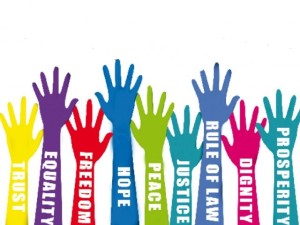HRW "unlikes" Maduro
Invalid Image ID
 The 2014 World Report from Human Rights Watch just came out. Let’s just say the chapter on Venezuela is not too friendly with the government. Among its many money quotes, we find:
The 2014 World Report from Human Rights Watch just came out. Let’s just say the chapter on Venezuela is not too friendly with the government. Among its many money quotes, we find:
- “The Supreme Court and the National Electoral Council rejected appeals filed by the opposition candidate, Henrique Capriles Radonski, challenging the results.”
- “For example, the Forum for Life, a network of 18 Venezuelan human rights organizations, reported that security forces had arbitrarily detained at least 62 individuals and injured 38 others in demonstrations in the state of Lara on April 15 and 16. The detainees reported that they were severely beaten, threatened with sexual violence, and deprived of food for more than 24 hours… Official sources reported that nine individuals were killed at the time, although the circumstances in which the deaths occurred remain unclear.”
- “President Maduro and other high level officials have used the threat of criminal investigations as a political tool, attributing responsibility for all acts of violence during demonstrations to Capriles.”
- “In April 2013, Globovisión was sold to government supporters because, according to its owner, it had become politically, economically, and legally unviable. Since then, it has significantly reduced its critical programming.”
- “For example, in July 2013, the minister of interior accused Rocío San Miguel, the director of the nongovernmental organization Citizen Control, of being a “CIA operator in Venezuela” who is conducting a “psychological campaign” against the government’s security policies.”
- “In April 2013, Minister of Housing Ricardo Molina called on all ministry personnel who supported the opposition to resign, saying that he would fire anyone who criticized Maduro, Chávez, or the “revolution.””
- “As a member of the UN Human Rights Council, Venezuela has spoken out against UN action to respond to human rights violations in places such as North Korea. During the September 2013 session of the Human Rights Council, it was the only country to vote against a resolution condemning human rights violations committed against the Syrian people.”
- “In June 2013, Venezuela became the pro-tempore president of Mercosur, a year after joining the regional bloc. The Asunción Protocol on Commitment with the Promotion and Protection of Human Rights of Mercosur states that “full respect of democratic institutions and the respect of human rights” are essential for regional integration, and that state parties will “cooperate for the effective promotion and protection of human rights.” By not addressing the absence of an independent judiciary in Venezuela, as well as the government’s efforts to undermine human rights protections, the other Mercosur member states have failed to uphold these commitments.”
Caracas Chronicles is 100% reader-supported.
We’ve been able to hang on for 22 years in one of the craziest media landscapes in the world. We’ve seen different media outlets in Venezuela (and abroad) closing shop, something we’re looking to avoid at all costs. Your collaboration goes a long way in helping us weather the storm.
Donate




